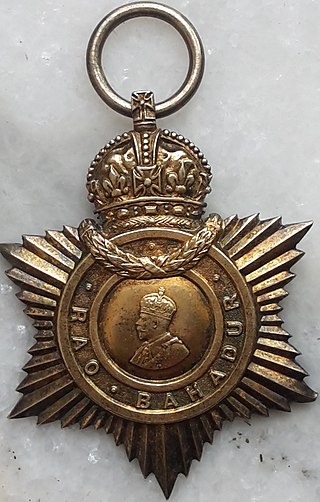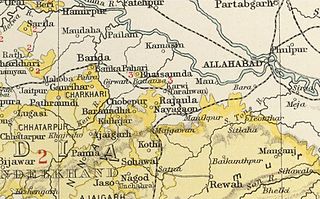| |||||
| Centuries: | |||||
|---|---|---|---|---|---|
| Decades: | |||||
| See also: | List of years in India Timeline of Indian history | ||||
Events in the year 1837 in India.
| |||||
| Centuries: | |||||
|---|---|---|---|---|---|
| Decades: | |||||
| See also: | List of years in India Timeline of Indian history | ||||
Events in the year 1837 in India.

The Most Eminent Order of the Indian Empire is an order of chivalry founded by Queen Victoria on 1 January 1878. The Order includes members of three classes:

Rao Bahadur and Rai Bahadur, abbreviatedR.B., was a title of honour bestowed during British rule in India to individuals for outstanding service or acts of public welfare to the Empire. From 1911, the title was accompanied by a medal called a Title Badge. Translated, Rao means "King", and Bahadur means "Brave". Bestowed mainly on Hindus, the equivalent title for Muslim and Parsi subjects was Khan Bahadur. For Sikhs it was Sardar Bahadur.

The Imperial Legislative Council (ILC) was the legislature of British India from 1861 to 1947. It was established under the Government of India Act 1853 by providing for the addition of six additional members to the Governor General Council for legislative purposes. Thus, the act separated the legislative and executive functions of the council and it was this body within the Governor General's Council which came to known as the Indian/Central Legislative Council. In 1861 it was renamed as Imperial Legislative Council and the strength was increased.

The Council of State was the upper house of the legislature for British India created by the Government of India Act 1919 from the old Imperial Legislative Council, implementing the Montagu–Chelmsford Reforms. The Central Legislative Assembly was the lower house.

Paldeo, also spelt 'Paldev', was a princely estate (Jagir) in India during the British Raj. It was under the Bundelkhand Agency of the Central India Agency until 1896 when it was transferred to the Baghelkhand Agency. In 1931 it was transferred back to the Bundelkhand Agency. It had an area of 52 square miles. In 1940 its population was 9,820 distributed in 18 villages. Paldeo Estate was merged into the Indian state of Vindhya Pradesh in 1948.

General elections were held in British India between 28 October and late November 1926 to elect members of the Imperial Legislative Council and the Provincial Legislative Councils.
General elections were held in British India in September 1930. They were boycotted by the Indian National Congress and marked by public apathy. The newly elected Central Legislative Assembly met for the first time on 14 January 1931.
Events in the year 1841 in India.
This article details events in the year 1840 in India. Occurrences include the establishment of the Bank of Bombay, and the fall of the Maqpon dynasty.
This article details events occurring in the year 1839 in India. Major events include the reduction of the Khanate of Kalat to a subsidiary ally of the British, and the capture of Aden in Yemen by the East India Company, creating an important stopover for voyages between Europe and India.
This list details events in the year 1838 in India. Major events include the Agra famine of 1837-38, and the founding of the Times of India on 3 November.
Events in the year 1867 in India.
Events in the year 1866 in India.
Events in the year 1855 in India.
Events in the year 1854 in India.
Events in the year 1851 in India.
The 1911 Delhi Durbar was held in December 1911 following the coronation in London in June of that year of King George V and Queen Mary. The King and Queen travelled to Delhi for the Durbar. For the occasion, the statutory limits of the membership of the Order of the Star of India and the Order of the Indian Empire were increased and many appointments were made to these and other orders. These honours were published in a supplement to the London Gazette dated 8 December 1911.